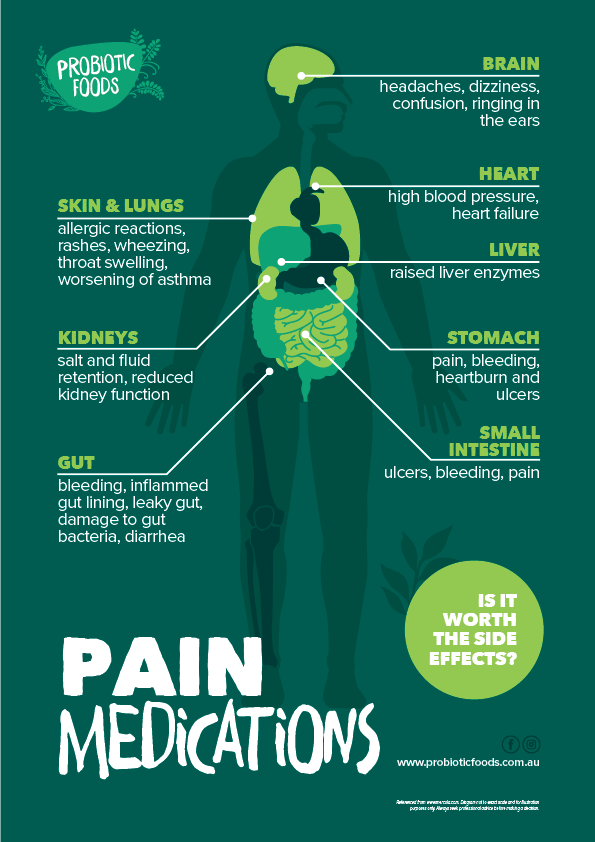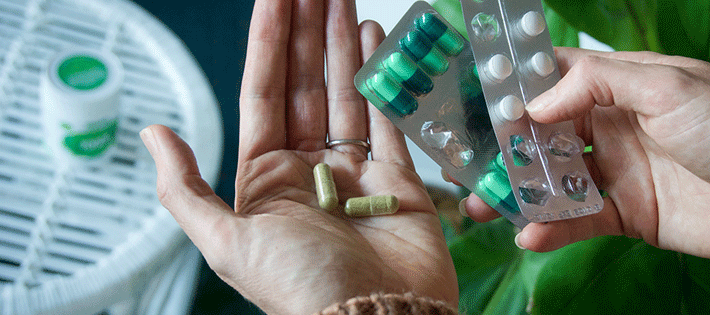Use and addiction to pain medication in Australia is becoming a national emergency. It’s a touchy subject as many people are unaware of the devastating side effects of pain killers—especially to the gut—nor the range of alternative therapies that can be used to manage pain.
We all experience acute pain from time to time whether it’s a headache, in the joints or muscles. But do you automatically reach for a pill to ease your suffering or do you wonder what the body is telling you? Slow down, stop, get more rest, move differently, take time out, get help?
Pain and discomfort is the body’s way of saying, “Whoa, that doesn’t feel good.” We put up it for many reasons, mainly because we think we don’t have time or energy to deal with it. Maybe we are scared of finding out what the pain really means and what we have to confront in our lives to change it.
Either way, we have developed a culture of pill popping and it’s not doing our guts, brain, or health any good. The discomfort we experience is the body’s way of saying there is some kind of inflammation going on, and the origin of that inflammation is usually the gut.
The gut and the it’s lining is like the bouncer on the night club door. It’s job is to stop the toxic food molecules, harmful viruses and chemicals creating havoc inside the blood stream. But when the gut lining is damaged by antibiotics, toxic food proteins like gluten, pathogenic viruses and stress the bouncers are knocked out. The bad guys get through the gut wall and start fights with the immune system. The result is inflammation—in your joints, muscles, brain … and your gut.
 Research clearly shows that Non Steroidal Anti Inflammatories (NSAIDS) that are used to treat mild pain like brufen, paracetamol, voltaren, and aspirin can attack the gut lining and lead to inflammation, the very problem for which these drugs have been designed to help!
Research clearly shows that Non Steroidal Anti Inflammatories (NSAIDS) that are used to treat mild pain like brufen, paracetamol, voltaren, and aspirin can attack the gut lining and lead to inflammation, the very problem for which these drugs have been designed to help!
So if you didn’t have a pain in the gut beforehand, after taking NSAIDS you’re likely to develop one. NSAIDS painkillers can have serious side effects that include:
• Stomach pain, bleeding and heartburn
• Stomach ulcers
• A tendency to bleed more
• Headaches and dizziness
• Ringing in the ears
• Allergic reactions such as rashes, wheezing, and throat swelling
• Liver or kidney problems
• High blood pressure
• Leg swelling
Gut bacteria
Your gut bacteria are the big bouncers that get knocked out when you take pain meds. It’s ironic that NSAIDs not only change the type AND numbers of gut bacteria but they reduce the effectiveness of the drugs you are taking. We are only just recognising the important role that gut bacteria play in breaking down and digesting chemicals and drugs.
Like antibiotics, if you are taking pain meds then take probiotics to help repopulate and restore your gut. Probiotic Foods contains more than 12 strains of good gut bacteria and a selection of anti-inflammatory wholefoods including fermented ginger, chia and flaxseeds.
“I took Probiotic foods Gluten and Fructose to help me recover from the toxic side effects of surgery. As soon as I started, I noticed an increase in my energy levels.”
Nicolette, Hervey Bay
Other ways to manage pain and inflammation
Apart from medication, diet and stress are the 2 major sources of inflammation that can cause pain. Some alternative relief suggestions:
-
Get rid of sugar and drastically reduce the amount of grains you eat. High insulin levels from sugar, processed carbs and alcohol increase insulin levels promoting inflammation.
-
Take a high quality omega 3 oil and increase dietary sources from organic eggs, flax, hemp, chia and fresh walnuts. Reduce damaged fats from heated vegetable oils.
-
Take wholefood fermented Probiotic Foods. Probiotics can generally support a strong gut lining, prevent leaky gut and help reduce inflammation.
-
Try herbal anti-inflammatories like turmeric, ginger, boswelia, bromelain, cats claw.
-
Get sunshine to boost your Vitamin D and improve the pathways that reduce inflammation.
-
Essential oils like peppermint and wintergreen are wonderful topical pain relievers.
-
Work with your health professional to find ways of managing pain, through counselling, bodywork and Emotional Freedom Technique.
Footnote: When pain becomes chronic – after an accident, chronic illness or degeneration – sufferers start looking for something stronger. Moderate to severe pain is usually treated with painkillers called opioids. E.g. codeine, tramadol, morphine, fentanyl and oxycodone. Accidental overdose of prescription opioids kill more Australians—800 each year—than heroin.
If you or someone you know is suffering from chronic pain or addiction and needs help please call ScriptWise (03) 9909 2807 or the Pain Link helpline 1300 340 357.
“Thank you for saving my life! I have more energy than I’ve had in 20 years and can move about pain free.”
Bridgette, 47, Inverell, NSW


